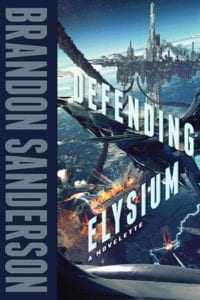Annotation- Defending Elysium

It’s hard to dig back through my memory to the days when I wrote the rough draft of this story. What was going through my head?
The story was written on a beach near Monterey California, and remains the only published piece of mine I did entirely in longhand before transcribing to the computer. I’d never been to Monterey before, and a friend was able to trade something he did at work for a week’s stay in a little condo-style hotel. We had two rooms and a very nice view over the city down toward the water.
So I guess I was doing the whole bohemian thing. During these days, I hadn’t yet gotten published (this would have been late 2001 or early 2002). I had graduated from college, but had been rejected from all of the grad schools I’d applied for. I’d written about a dozen novels, and was annoyed with myself recently for not writing books that were true to what I wanted to be as a writer.
The call regarding the sale of Elantris would not come for another year or so. I was working a graveyard shift at the hotel, renting a room in a friend’s basement for $300 a month, and spending all the time I could practicing my craft. (In part to delay thinking about what I was going to do with my life since my writing wasn’t selling and grad schools didn’t want me.)
Over the next year, I would write a book called The Way of Kings, the best—yet most flawed—book I wrote during my unpublished years. A massive, beastly epic that was my symbolic discarding of any desire to chase the market or write anything that was not the type of writing I loved to read.
That was my mind-set. I remember a couple of long afternoons sitting on the beach, listing to the waves and staring out over the ocean as I wrote. A good friend named Annie was there for most of it—you may know her as the woman that Sarene from Elantris was based on—writing in her journal. Micah (you may know him as Captain Demoux from the Mistborn books, and also as the official Brandon Sanderson jacket flap photographer) was in and out. Mostly he was off taking photos.
I remember wanting to see if I could imbue a short story with the type of characterization and multiple plots that I liked in my epic fantasy. I had an idea for a character with a deep and interesting past, alongside a nice dissonant element (a secret agent working for the phone company). That, along with an interesting idea for an ending, grew into this story.
Oddly, I was able to make this work in a short story the way I wanted, while writing shorter novels hadn’t worked for me. I chalk that one up to me starting to find the natural size for a story and writing it at that size. Ironically, the novels I’d written recently (Final Empire and Mistborn, the ideas for which would eventually be recycled into a single volume you know as Mistborn: The Final Empire) were ones that I’d tried intentionally to write “short.” And in doing that, I’d ended up filling each book with too few ideas for even their short length.
With “Defending Elysium,” I took a short story (well, novelette) and filled it with as many ideas as I could pack into the space. The result is a very dense story (in plot, history, and world terms) that ended up satisfying all of the epic storytelling buttons I like having pushed.
I ended up submitting this to The Leading Edge (the magazine I worked on) during one of my last months there. I did it under a pseudonym, a practice common for staff members, to get some feedback. (The Leading Edge gives feedback on all submissions. I didn’t intend to publish it there; I just wanted some honest opinions.) Turns out that one of my best friends read the story, then spent about an hour the following evening telling me about this great story he’d read out of the slush, and how he couldn’t believe that such an awesome story had ended up getting submitted to TLE just out of nowhere. (That gave me an inkling that the story might have some potential. . . .)
That’s the background on the story. For those who like to dig deeper into the meaning and context of a story, perhaps that’s given you something to chew on. This was a melancholy time of my life—perhaps the time when I was most adrift—yet at the same time, it was one of the most artistically uninhibited times of my life. No contracts, no deadlines, no artificial rules imposed on myself. I had decided that the world could do whatever it wanted, and I would just write what I loved even if it never got published.
So, of course, the following year this story got a Writers of the Future nod and Elantrisgot picked up by Tor.
